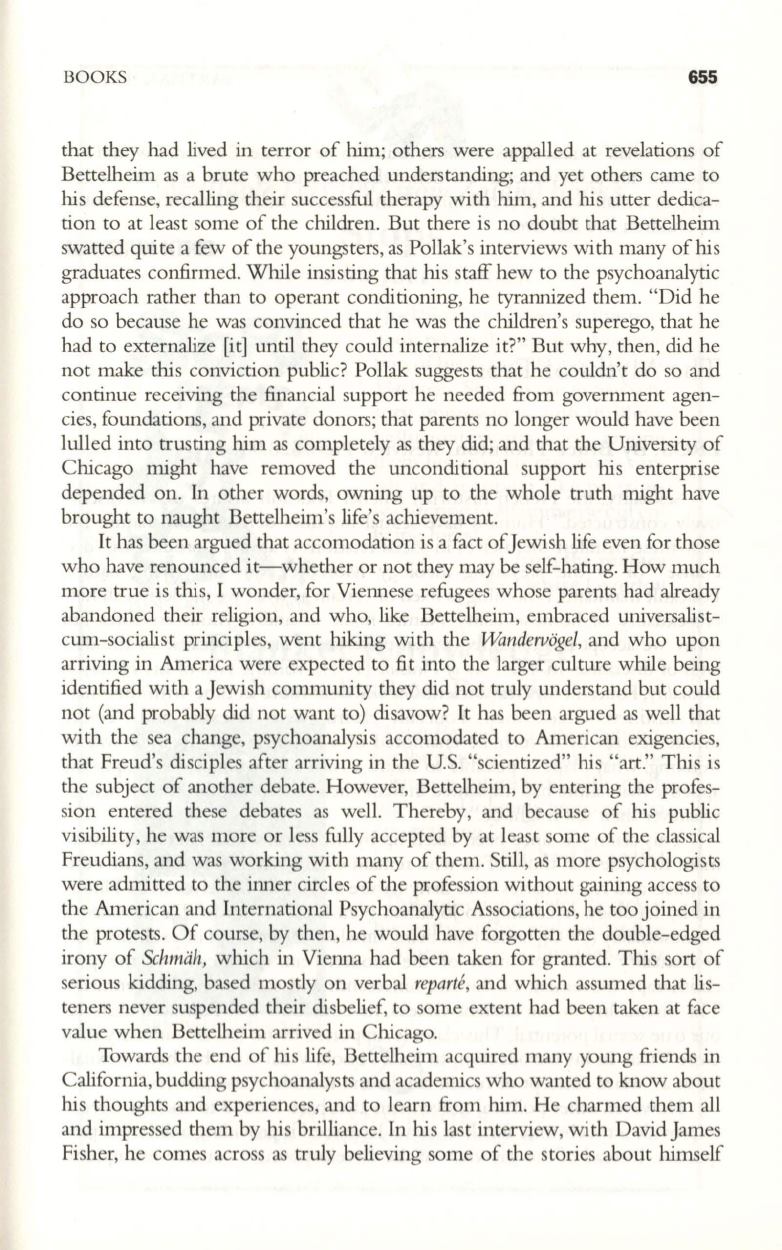
BOOKS
655
that they had lived in terror of
him;
others were appalled at revelations of
Bettelheim as a brute who preached understanding; and yet others came to
his defense, recalling their successful therapy with
him,
and his utter dedica–
tion to at least some of the children. But there is no doubt that Bettelheim
swatted quite a few of the youngsters, as Pollak's interviews with many of his
graduates confirmed. While insisting that his staff hew to the psychoanalytic
approach rather than to operant conditioning, he tyrannized them. "Did he
do so because he was convinced that he was the children's superego, that he
had to externalize [it] until they could internalize it?" But why, then, did he
not make this conviction public? Pollak suggests that he couldn't do so and
continue receiving the financial support he needed from government agen–
cies, foundations, and pt;ivate donors; that parents no longer would have been
lulled into trusting him as completely as they did; and that the University of
Chicago might have removed the unconditional support his enterprise
depended on. In other words, owning up to the whole truth might have
brought to naught Bettelheim's life's achievement.
It has been argued that accomodation is a fact ofJewish life even for those
who have renounced it-whether or not they may be self-hating. How much
more true is this, I wonder, for Viennese refugees whose parents had already
abandoned their religion, and who, like Bettelheim, embraced universalist–
cum-socialist principles, went hiking with the
Wandervogel,
and who upon
arriving in America were expected to fit into the larger culture while being
identified with a Jewish community they did not truly understand but could
not (and probably did not want to) disavow? It has been argued as well that
with the sea change, psychoanalysis accomodated to American exigencies,
that Freud's disciples after arriving in the
u.s.
"scientized" his
"art."
This is
the subject of another debate. However, Bettelheim, by entering the profes–
sion entered these debates as well. Thereby, and because of his public
visibility, he was more or less fully accepted by at least some of the classical
Freudians, and was working with many of them. Still, as more psychologists
were admitted to the inner circles of the profession without gaining access to
the American and International Psychoanalytic Associations, he too joined in
the protests. Of course, by then, he would have forgotten the double-edged
irony of
Schmiih,
which in Vienna had been taken for granted. This sort of
serious kidding, based mostly on verbal
reparte,
and which assumed that lis–
teners never suspended their disbelief, to some extent had been taken at face
value when Bettelheim arrived in Chicago.
Towards the end of his life, Bettelheim acquired many young friends in
California, budding psychoanalysts and academics who wanted to know about
his thoughts and experiences, and to learn from
him.
He charmed them all
and impressed them by his brilliance. In his last interview, with David James
Fisher, he comes across as truly believing some of the stories about himself


